Unit 6 Section B(2a-2c)课件+内嵌音频(新目标七年级上册Unit 6Do you like bananas? )
文档属性
| 名称 | Unit 6 Section B(2a-2c)课件+内嵌音频(新目标七年级上册Unit 6Do you like bananas? ) |

|
|
| 格式 | pptx | ||
| 文件大小 | 5.6MB | ||
| 资源类型 | 试卷 | ||
| 版本资源 | 人教新目标(Go for it)版 | ||
| 科目 | 英语 | ||
| 更新时间 | 2023-11-20 16:26:06 | ||
图片预览



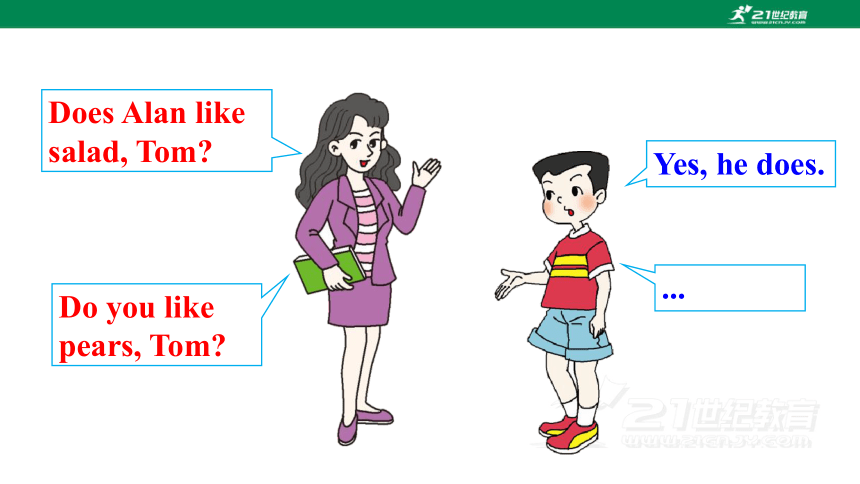
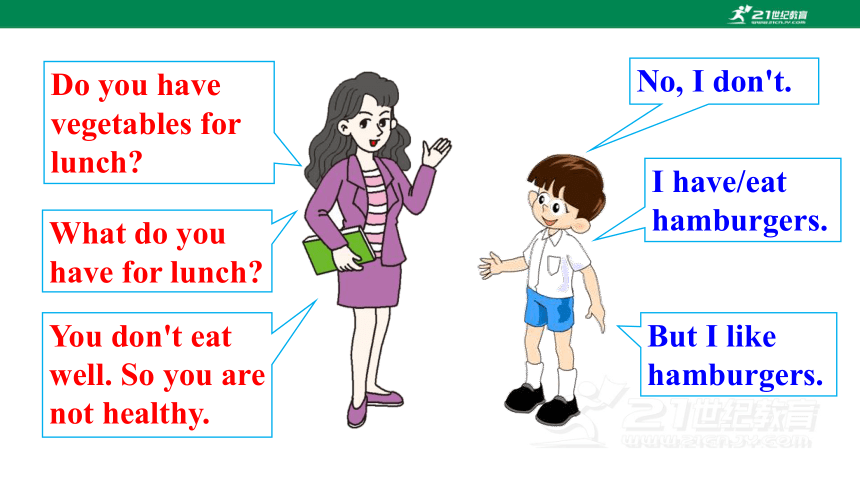
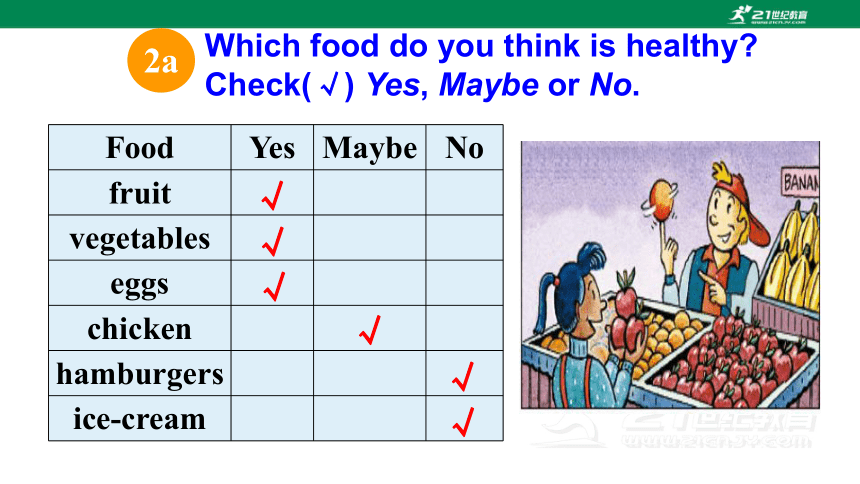
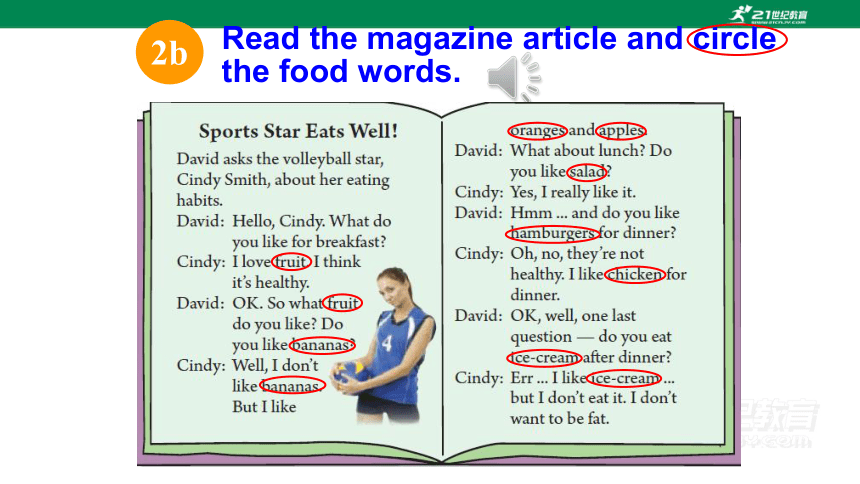
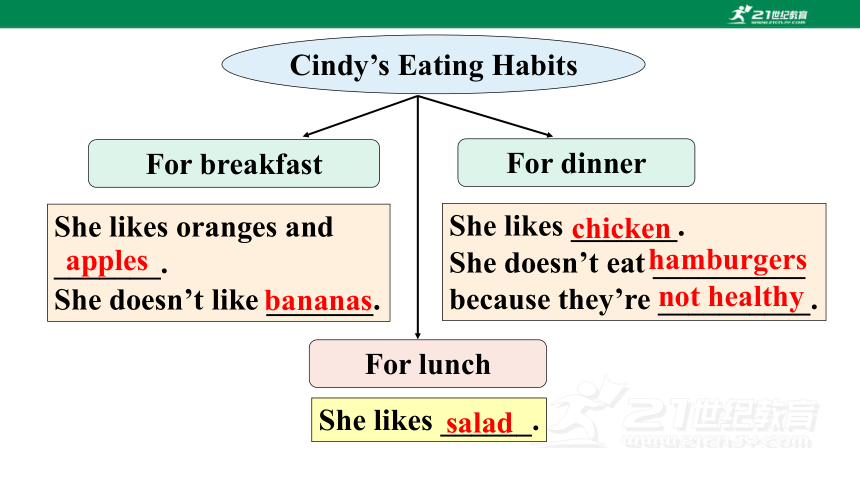
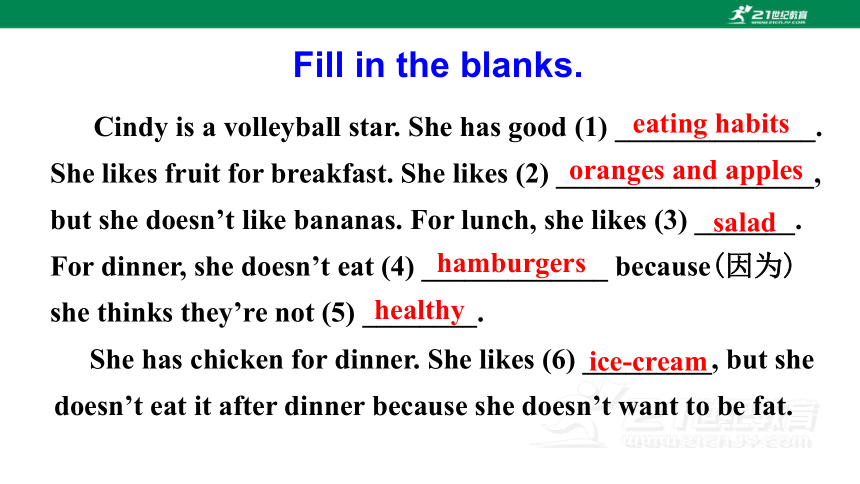
文档简介
(共21张PPT)
Unit 6
Do you like bananas
Section B
2a-2c
star
eat
well
habit
healthy
really
question
want
be
fat
n.明星;星星
v.吃
adv.好;令人满意地
n.习惯
adj.健康的
adv.真正地
n.问题
v.需要;想要
v.变成
adj.肥的; 肥胖的
Words and expressions
Do you like salad, Alan
Yes, I do.
Does Alan like salad, Tom
Yes, he does.
Do you like pears, Tom
...
Do you have vegetables for lunch
No, I don't.
What do you have for lunch
I have/eat hamburgers.
You don't eat well. So you are not healthy.
But I like hamburgers.
2a
Which food do you think is healthy Check(√) Yes, Maybe or No.
Food Yes Maybe No
fruit
vegetables
eggs
chicken
hamburgers
ice-cream
√
√
√
√
√
√
Read the magazine article and circle the food words.
2b
Cindy’s Eating Habits
For breakfast
For lunch
For dinner
She likes oranges and _______.
She doesn’t like _______.
She likes ______.
She likes _______.
She doesn’t eat __________ because they’re __________.
apples
bananas
salad
chicken
hamburgers
not healthy
Cindy is a volleyball star. She has good (1) ______________. She likes fruit for breakfast. She likes (2) __________________, but she doesn’t like bananas. For lunch, she likes (3) _______. For dinner, she doesn’t eat (4) _____________ because(因为) she thinks they’re not (5) ________.
Fill in the blanks.
eating habits
oranges and apples
salad
hamburgers
healthy
She has chicken for dinner. She likes (6) _________, but she doesn’t eat it after dinner because she doesn’t want to be fat.
ice-cream
2c
Write five sentences about Cindy’s
eating habits.
Cindy likes healthy food.
1. Cindy _____________________
2. She _________________________
3. She _________________________
4. Cindy doesn’t _________________________
5. She doesn’t __________________________
loves fruit.
eat ice-cream after dinner.
likes oranges and apples.
likes salad for lunch.
like hamburgers for dinner.
Language points
good和well都有“好”之意,但是good为形容词,主要修饰名词,在句中作定语或表语;而well为副词,主要修饰动词,表示“做某事做得好”。
1. Sports Star Eats Well! 体育明星吃得好!
well, good和fine
well
good
fine
通常指天气好,也可以指人的身体好
形容词,一般指人的品质好或物品的质量好
作为形容词,意为“健康的”,放在连系动词后作表语;作为副词,意为“做某事做得好”,修饰动词
2.What do you like for breakfast
你早餐喜欢吃什么?
“What do/does主语+like for+某餐?”用于询问某人某餐喜欢吃什么。
介词for与一日三餐名称搭配使用时,表示各餐喜欢吃的食物。
例:我午餐喜欢吃鱼。
I like fish for lunch.
3. I think it’s healthy.我认为它是健康的。
例:这位奶奶年纪很大了,可她看起来很健康。
The granny is old. But she looks healthy.
healthy为形容词,意为“健康的”,其名词形式为health,意为“健康”。常用短语keep/stay healthy,意为“保持健康”,相当于be in good health。
4. I don’t want to be fat. 我可不想变胖。
want to be … 意为“想要变得……;想要成为……”,动词 be 之后接形容词或名词。
她不想成为一名教师。
She doesn’t want to be a teacher.
want 作及物动词,意为“需要;想要”。
(1) want sth. 想要某物
I want a map.我想要一张地图。
(2) want to do sth. 想做某事
The girl wants to go home.那女孩想回家。
(3) want sb.(not) to do sth. 想要某人(不)做某事
I want you to help me find my bag.
我想让你帮我找到包。
Exercise
Ⅰ. 根据句意及所给汉语提示,写出句中所缺单词。
1. Ma Lin and Wang Hao are ping-pong _____(明星).
2. Mom, I ______(想要) that purple ruler.
3. Helen, reading is a good _______(习惯).
4. Jane always does _____(令人满意地) in her English tests.
5. Can I ask you some __________(问题)
stars
want
habit
well
questions
Ⅱ.根据汉语意思完成英语句子,每空一词。
1.我爷爷的饮食习惯很好。
My grandfather’s ______ _____ are good.
2.你晚饭喜欢吃什么?
_____ do you _____ for dinner
3.我可以询问玛丽的家庭情况吗?
Can I ____ Mary ______ her family
4.我姐姐想成为一名老师。
My sister ______ ____ ___ a teacher.
eating habits
What like
ask about
wants to be
1.What do you like for breakfast
2.So what fruit do you like
3.They’re not healthy.
4.I don’t want to be fat.
summary
1.用英文写出自己的一日三餐。
2.完成本课时相关练习。
The end!
Unit 6
Do you like bananas
Section B
2a-2c
star
eat
well
habit
healthy
really
question
want
be
fat
n.明星;星星
v.吃
adv.好;令人满意地
n.习惯
adj.健康的
adv.真正地
n.问题
v.需要;想要
v.变成
adj.肥的; 肥胖的
Words and expressions
Do you like salad, Alan
Yes, I do.
Does Alan like salad, Tom
Yes, he does.
Do you like pears, Tom
...
Do you have vegetables for lunch
No, I don't.
What do you have for lunch
I have/eat hamburgers.
You don't eat well. So you are not healthy.
But I like hamburgers.
2a
Which food do you think is healthy Check(√) Yes, Maybe or No.
Food Yes Maybe No
fruit
vegetables
eggs
chicken
hamburgers
ice-cream
√
√
√
√
√
√
Read the magazine article and circle the food words.
2b
Cindy’s Eating Habits
For breakfast
For lunch
For dinner
She likes oranges and _______.
She doesn’t like _______.
She likes ______.
She likes _______.
She doesn’t eat __________ because they’re __________.
apples
bananas
salad
chicken
hamburgers
not healthy
Cindy is a volleyball star. She has good (1) ______________. She likes fruit for breakfast. She likes (2) __________________, but she doesn’t like bananas. For lunch, she likes (3) _______. For dinner, she doesn’t eat (4) _____________ because(因为) she thinks they’re not (5) ________.
Fill in the blanks.
eating habits
oranges and apples
salad
hamburgers
healthy
She has chicken for dinner. She likes (6) _________, but she doesn’t eat it after dinner because she doesn’t want to be fat.
ice-cream
2c
Write five sentences about Cindy’s
eating habits.
Cindy likes healthy food.
1. Cindy _____________________
2. She _________________________
3. She _________________________
4. Cindy doesn’t _________________________
5. She doesn’t __________________________
loves fruit.
eat ice-cream after dinner.
likes oranges and apples.
likes salad for lunch.
like hamburgers for dinner.
Language points
good和well都有“好”之意,但是good为形容词,主要修饰名词,在句中作定语或表语;而well为副词,主要修饰动词,表示“做某事做得好”。
1. Sports Star Eats Well! 体育明星吃得好!
well, good和fine
well
good
fine
通常指天气好,也可以指人的身体好
形容词,一般指人的品质好或物品的质量好
作为形容词,意为“健康的”,放在连系动词后作表语;作为副词,意为“做某事做得好”,修饰动词
2.What do you like for breakfast
你早餐喜欢吃什么?
“What do/does主语+like for+某餐?”用于询问某人某餐喜欢吃什么。
介词for与一日三餐名称搭配使用时,表示各餐喜欢吃的食物。
例:我午餐喜欢吃鱼。
I like fish for lunch.
3. I think it’s healthy.我认为它是健康的。
例:这位奶奶年纪很大了,可她看起来很健康。
The granny is old. But she looks healthy.
healthy为形容词,意为“健康的”,其名词形式为health,意为“健康”。常用短语keep/stay healthy,意为“保持健康”,相当于be in good health。
4. I don’t want to be fat. 我可不想变胖。
want to be … 意为“想要变得……;想要成为……”,动词 be 之后接形容词或名词。
她不想成为一名教师。
She doesn’t want to be a teacher.
want 作及物动词,意为“需要;想要”。
(1) want sth. 想要某物
I want a map.我想要一张地图。
(2) want to do sth. 想做某事
The girl wants to go home.那女孩想回家。
(3) want sb.(not) to do sth. 想要某人(不)做某事
I want you to help me find my bag.
我想让你帮我找到包。
Exercise
Ⅰ. 根据句意及所给汉语提示,写出句中所缺单词。
1. Ma Lin and Wang Hao are ping-pong _____(明星).
2. Mom, I ______(想要) that purple ruler.
3. Helen, reading is a good _______(习惯).
4. Jane always does _____(令人满意地) in her English tests.
5. Can I ask you some __________(问题)
stars
want
habit
well
questions
Ⅱ.根据汉语意思完成英语句子,每空一词。
1.我爷爷的饮食习惯很好。
My grandfather’s ______ _____ are good.
2.你晚饭喜欢吃什么?
_____ do you _____ for dinner
3.我可以询问玛丽的家庭情况吗?
Can I ____ Mary ______ her family
4.我姐姐想成为一名老师。
My sister ______ ____ ___ a teacher.
eating habits
What like
ask about
wants to be
1.What do you like for breakfast
2.So what fruit do you like
3.They’re not healthy.
4.I don’t want to be fat.
summary
1.用英文写出自己的一日三餐。
2.完成本课时相关练习。
The end!
同课章节目录
- starters 预备篇(2012秋审查)
- Unit 1 Good morning !
- Unit 2 What’s this in English?
- Unit 3 What color is it ?
- Unit 1 My name's Gina.
- Section A
- Section B
- Unit 2 This is my sister.
- Section A
- Section B
- Unit 3 Is this your pencil?
- Section A
- Section B
- Unit 4 Where's my schoolbag?
- Section A
- Section B
- Unit 5 Do you have a soccer ball?
- Section A
- Section B
- Unit 6 Do you like bananas?
- Section A
- Section B
- Unit 7 How much are these socks?
- Section A
- Section B
- Unit 8 When is your birthday?
- Section A
- Section B
- Unit 9 My favorite subject is science.
- Section A
- Section B
